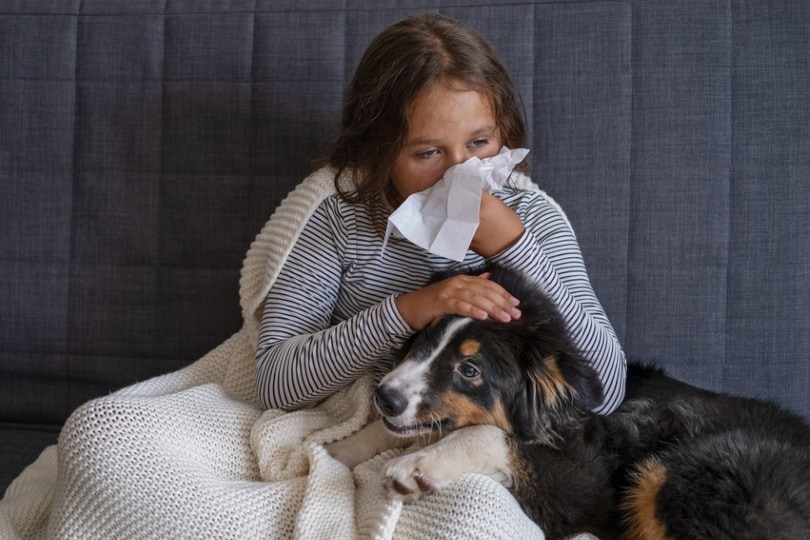Are Australian Shepherds Hypoallergenic? Vet-Reviewed Facts & FAQ
Updated on

Did you want to adopt an Australian Shepherd but wondered if they are hypoallergenic? Unfortunately, Australian Shepherds are not hypoallergenic. However, it isn’t because they shed a lot.
Instead, they aren’t hypoallergenic simply because there aren’t any hypoallergenic dog breeds out there.1 Even dogs that don’t shed still cause allergies—often at the same rate as dogs that do shed. The term “hypoallergenic dog” is a myth. There is no scientific proof that any dog breed triggers lower allergy symptoms than others.
Studies have clearly shown that homes with “hypoallergenic-considered” dogs and homes with “normal” dogs have the same number of allergens.2 To understand exactly why Australian Shepherds (and other dogs) aren’t hypoallergenic, it’s essential to understand how dog allergies work.
What Are Dog Allergies?
When someone has dog allergies, they are not allergic to the dog’s hair. Instead, they are allergic to some of the proteins that the dog produces, called allergens. There are actually several allergens described in dogs, some of which have been studied more than others.
These proteins are found in the dog’s dander, saliva, and urine and carried on hair and dander. While hairless dogs or dogs that don’t shed may not spread their hair around, they will still make the same amount of dander, saliva, and urine. In other words, they still tend to create the same amounts of allergens that other dogs do.
Allergens themselves are harmless proteins. However, in those with dog allergies, their immune system interprets them as foreign invaders. Therefore, the immune system responds to the “threat” of canine protein just like it would anything else. It does this through the release of histamine.
The symptoms dog allergies cause are actually due to the immune system overreacting—not the dog’s protein doing anything malicious. For one reason or another, the immune system simply thinks it needs to defend against the dog’s dander—even though it is harmless.
Signs often include a runny nose, asthma attacks, sneezing, congestion, itchy eyes, and even hives. The closer contact you have with the dog, the worse your signs are. Some people can be around a dog for a moment but develop signs if they are regularly in a home with the dog.

What About Hypoallergenic Dogs?
All dogs create allergens. Therefore, all dogs can potentially cause allergies. Originally, it was assumed that dogs that didn’t shed might spread allergens around less, making it easier for people with dog allergies to handle. However, we have since discovered this doesn’t seem to be the case. Dog’s allergens even find their way into dogless homes.
Therefore, non-shedding dogs do not produce fewer allergens. Instead, these dogs simply spread fur around less, which may or may not make a difference for an allergic person in the long run.
As you can see, hypoallergenic dogs don’t exist. Australian Shepherds are not hypoallergenic at all. Plus, they also shed moderately to heavy amounts of hair, which also means that they aren’t considered non-shedding dogs either.
Different Canine Proteins
With that said, the type of dog protein you’re allergic to matters. Not everyone is allergic to every type, and not every dog produces every type. Therefore, it is under study if those with dog allergies might be completely fine to live with some dogs—as long as they can find a dog that doesn’t produce the protein they’re allergic to.
Dogs produce different types of allergens, and these are named following a standard structure. In dogs, the most studied ones are Can f 1 and Can f 2, but there are more.
The most common allergen is Can f 1. Sadly, all dogs produce this protein. It is found in the skin of all Australian Shepherds. Therefore, if you are allergic to it, an Australian Shepherd would surely cause symptoms. However, only intact males produce the Can f 5 protein. This protein is specifically made inside the prostate gland. If a male is intact, they produce it. Otherwise, they don’t.
For those allergic to this particular type of protein, female Australian Shepherds might be a good choice, but this is currently under study.
Most dog allergy tests check for all the proteins at the same time. Therefore, they can let you know if you’re allergic to dogs in general—but not the specific protein you’re allergic to. The best thing to do is speak to your allergist to better understand your allergies. You will also need to consider your allergic threshold, since you may be suffering from other types of allergies simultaneously. Minimizing your exposure to allergens other than your dog’s can help you stay below your symptom threshold, which means you won’t experience the uncomfortable allergy signs.

Are Australian Shepherds Bad for Allergies?
Australian Shepherds are not any worse for those with allergies than other types of dog breeds. In fact, the production of allergens varies between individuals, not between breeds.
Are Mini Australian Shepherds Hypoallergenic?
No, mini Australian Shepherds still produce allergens, so they are not hypoallergenic either. They also shed exactly the same amount.

Final Thoughts
Australian Shepherds shed a lot. However, this isn’t necessarily why they produce an immune response in people with dog allergies. The proteins found in a dog’s skin, saliva, and urine are the reasons they induce an immune response in those with dog allergies. For this reason, all dogs can trigger an abnormal immune response, whether they shed or not.
If a dog has skin and they produce saliva, they also produce the proteins that those with dog allergies are allergic to!
Australian Shepherds shed a lot and require significant grooming. We recommend ensuring that you have plenty of time to meet these grooming needs before you commit to adopting one of these dogs.
Related Reads:
- How Big Do Australian Shepherds Get? The Surprising Answer!
- Are Australian Shepherds Born with Tails? Info, Facts, & Pictures
Featured Image Credit: Izemphoto, Shutterstock














